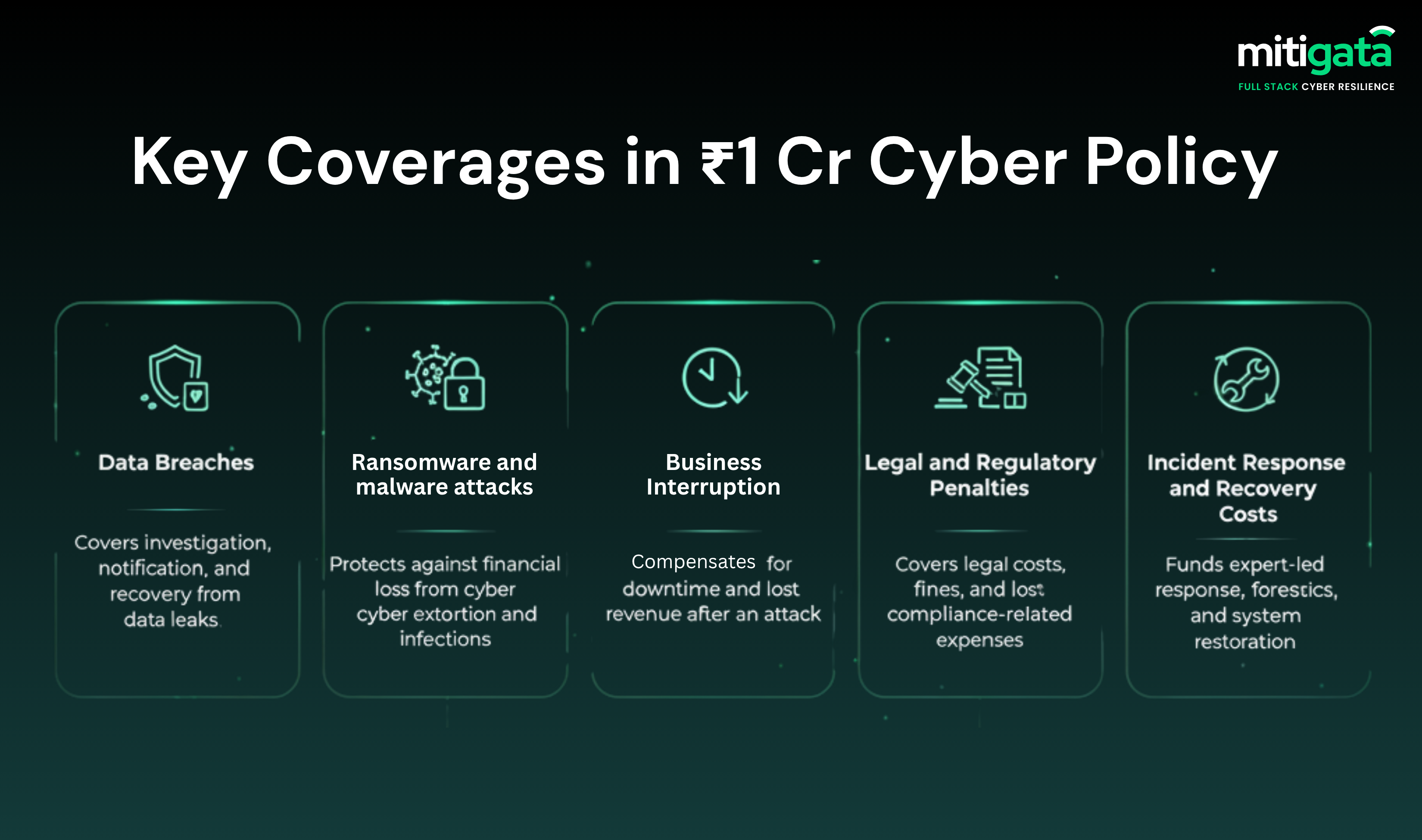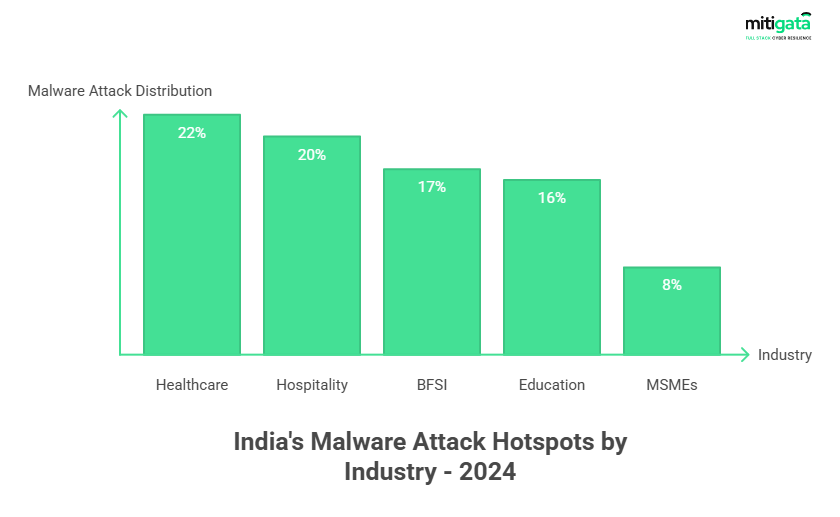The cybersecurity market is projected to increase by $6.4 trillion (+69.41%) between 2024 and 2029, reaching a new peak of $15.63 trillion by 2029.
We have now marked an eleventh consecutive year of increase.
There is no industry left that is untouched by cyberattacks. The manufacturing, finance, and insurance sectors are highly affected, with healthcare being the most targeted one.
Though awareness of cyber threats is also increasing, wth companies have started investing more in cybersecurity.
The global average cost of a data breach has reached $4.44 million in 2025.
And you are yet to get cyber insurance? No worries, we have got you covered with all the information you need, including the cyber liability insurance cost and factors affecting it.
Why 800+ Businesses Have Chosen Mitigata?
No one in the market delivers instant cyber insurance quotes and super-fast claims like we do. We are India’s one and only full-stack cyber resilience company, helping businesses with insurance, security and compliance.
Here’s what makes us stand out:
Exclusive access to the Mitigata Console: An all-in-one dashboard that allows you to track vulnerabilities, perform dark web scanning, and gain complete visibility into your company’s digital risk exposure.
Top Insurance Partners: We collaborate with reputable companies such as HDFC ERGO, ICICI Lombard, and Bajaj Allianz so that you get comprehensive coverage and faster claim service.
Best Market Rates: Our partnerships help you obtain the best policy at the most reasonable pricing.
24/7 Expert Support: Our team is always accessible to assist you with claims, renewals, and cyber incident responses.
Buying Cyber Insurance? Start with the Right Partner.
Save more with Mitigata and get exclusive tools to monitor your digital footprint proactively.

How Much Does Cyber Insurance Cost in India?
The average cost of cyber insurance depends on your business size, the type of high-risk data you handle, and the coverage amount you choose.
Partnered with leading insurers, Mitigata offers you a comprehensive cyber insurance coverage of ₹1 crore starting at just ₹95,000/year*.
This plan generally covers a wide range of cyber risks, including data breaches and ransomware attacks, as well as the costs of business downtime and incident response.
For larger businesses operating across multiple digital platforms and multiple regions, the coverage premium tends to scale upward depending on the risk factor.
The average cyber insurance premium for Indian businesses can range from ₹80,000 to ₹3,00,000 annually. Again, this highly depends on the scope of protection and business category.

What is Cyber Insurance?
Cyber insurance is a type of insurance for businesses to recover from financial losses caused by cyberattacks, data breaches, and other digital security risks.
We all have witnessed India’s sudden and major shift toward adopting digital payments and cloud-based systems.
The need and the demand for cyber insurance in India have broken records in 2024. The market value of cyber risk insurance in India was estimated at approx. USD 582.2 million.
What’s Covered Under Cyber Insurance
Data Breach Costs: The policy covers the costs of addressing affected users, restoring company records, and meeting legal or regulatory responsibilities.
Ransomware Payments and Negotiation Costs: Insurance covers ransom payments and the cost of employing professionals to tackle cyber extortion cases.
Business Interruption: It helps to compensate for lost income and other business interruption costs.
Reputation Management: The policy addresses crisis communication and public relations support to reestablish brand credibility following a cyber event.
Know more about cyber insurance and it’s coverage in this expertly curated guide.
What’s Not Covered
Known Incidents: Any breaches or vulnerabilities identified before the policy start date.
Intentional or Fraud Acts: Damages caused deliberately by employees or management.
Non-Cyber Failures: Events like power outages or hardware failures unrelated to a cyber event.
Insurance That Watches, Warns, and Works When You Need It.
Get the most value for every rupee – comprehensive protection, 24/7 support, and access to your personalised cyber risk dashboard.

Which Factors Drive Cyber Insurance Premiums in India?
The cost of cyber insurance in India depends on several factors:
- Company Size and Revenue
In comparison, larger companies have more staff (and tend to have more digital assets), which makes them more likely to be victims of phishing, data theft, or system penetration, and thus have a higher rate for cyber insurance.
For example, A SaaS-type company with a team size of 50 members might pay ₹90,000 for ₹1 crore worth of insurance, while a fintech-type company with 500 employees might pay over ₹2,00,000 for the same type of insurance.
Clearly, the bigger the company, the higher the likelihood of breaches.
- Industry Type
Some industries are inherently more attractive to cybercriminals. Healthcare is the most targeted industry, accounting for about 21.82% of all cyber threats detected in India. This is followed by the hospitality and BFSI industries, respectively.

- Data Sensitivity and Volume
The more confidential data a company stores, the more it costs to insure. Businesses that handle online transactions daily fall under high-risk categories since they store personal identifiable information (PII) and credit card details of clients.
A fintech company managing payment transactions always has greater liability than other industry firms.
- Cybersecurity Readiness
Insurers thoroughly assess your security risk posture. Businesses that invest heavily in advanced cybersecurity controls often have reduced premiums.
Even if you have firewalls, endpoint detection, multi-factor authentication and conduct routine audits along with phishing training for employees, the overall cyber risk insurance costs will be lower for you.
Firms that can demonstrate compliance with frameworks, such as ISO 27001 or the NIST framework, may receive better premiums, as they demonstrate a measurable commitment to controlling cyber risk.
Still confused about buying cyber insurance? Read this article and explore the top proven benefits of cyber insurance.
Coverage Limits and Deductibles Explained
If you’re purchasing a cyber insurance policy, two elements determine how much protection you’ll receive:
- Coverage Limit
The coverage limit sets the maximum that your insurer will pay out on your behalf for claims resulting from a cyber incident.
For instance, if your coverage limit is ₹1 crore, but your data breach results in ₹1.2 crore worth of damages, the insurer will only pay up to ₹1 crore, and you will pay the remaining ₹20 lakh of damages.
Choosing the appropriate limit is determined by your company’s size, the sort of data it handles, and the potential financial consequences of a breach.
- Deductible
The deductible is the amount you must pay out of pocket before insurance coverage begins. A greater deductible typically results in a lower premium, but it also increases your initial financial liability following an occurrence.
For instance, if your deductible is ₹5 lakh and you experience a ₹50 lakh cyber loss, your insurer will cover ₹45 lakh.
Finding the appropriate balance between coverage and deductible is important. Most businesses in India opt for a ₹1 crore limit and a ₹2–5 lakh deductible as a reasonable and affordable option.
The Only Cyber Insurance Partner You'll Ever Need
We go beyond coverage with our console-driven insights, 24/7 support, and top-tier protection at unbeatable pricing.

How to Lower Your Cyber Insurance Premiums
For some SMBs, cyber insurance policy cost can be high. However, some insurers offer better rates when companies actively mitigate their risk exposure through:
- Improved cyber controls
- Regular employee training
- Data encryption and backup policy
- Incident response plan
- Annually update policy
| Strategy | Description | Pro Tip |
| Stronger Cybersecurity Framework | Implement MFA, endpoint protection, and compliance audits. | Showcase certifications like ISO 27001 or SOC 2. |
| Employee Training | Conduct regular phishing and awareness training. | Track completion rates to demonstrate effectiveness. |
| Data Encryption & Backup | Encrypt data and maintain automated backups. | Test your restore process quarterly. |
| Incident Response Plan | Have documented IR & BCP procedures. | Simulate incidents to validate readiness. |
| Annual Policy Review | Reassess coverage as the business scales. | Share security upgrades with your insurer. |
Learn how to smoothly handle a cyber insurance claim with Mitigata’s step-by-step guide.
Cyber Insurance Cost Trends in India
The cyber insurance market in India is booming, due to the record-breaking digital transformation of businesses. These are the trends that are noticed by far:
Increasing Adoption Among SMEs
In 2024–25, small and mid-sized businesses are purchasing cyber insurance at record rates. As more operations move online, awareness of data breach risks and financial exposure is driving demand.
Premiums are Stabilising
After steep increases between 2021 and 2023 due to the global ransomware surge, premiums in India are now stabilising. Improved cybersecurity standards and better risk assessment models have helped balance pricing.
Industry-Specific Pricing
Highly regulated sectors such as finance, healthcare, and education still see comparatively higher premiums due to strict data protection laws.
Meanwhile, low-risk industries like manufacturing are benefiting from lower pricing.
Bundled and Tailored Policies
Insurers are introducing customised cyber insurance plans for startups and SMEs that combine affordable pricing with essential protections like data breach response and ransomware recovery.
Confused between so many insurance providers? Check out these top cyber insurance companies and their comparison in this guide.
How Mitigata Offers You The Best Cyber Insurance Quotes
In order to accurately evaluate your cyber risk and coverage options, Mitigata asks questions pertaining to your cyber posture. The questions encompass all aspects of your company, including:- Business Size: The number of people, scope of activities, and annual income.
- Geographic Exposure: Your business’s global presence and operating area.
- Client Business: The industries your clients work in, as well as how their data interacts with your systems.
- Security: The effectiveness of your cybersecurity protocols, including firewalls, encryption, and endpoint security.
- Retail and Cybersecurity: If applicable, how does your company handle data security in retail, e-commerce, or financial services?

